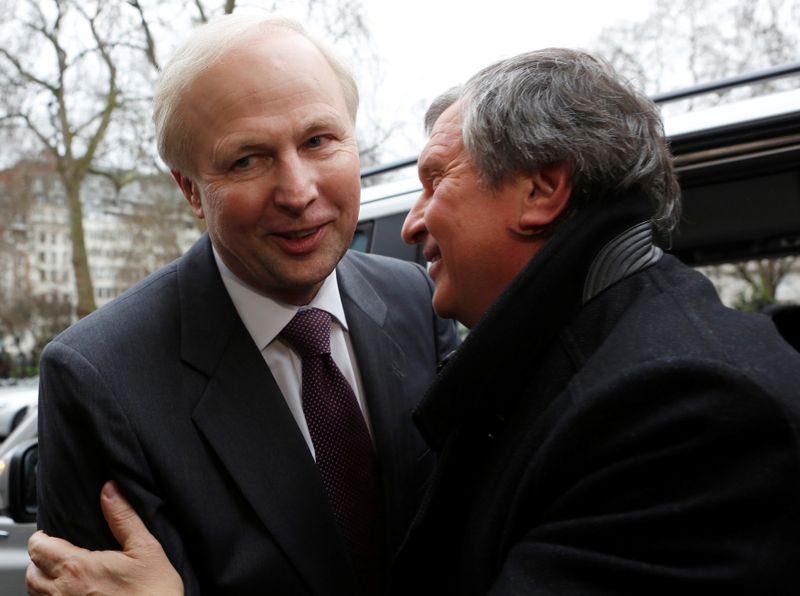By Ron Bousso, Darya Korsunskaya and Dmitry Zhdannikov
LONDON/MOSCOW (Reuters) - Incoming Chief Executive Bernard Looney will not take up either of BP's seats on the board of Rosneft when he takes over in February because of the complexity of the relationship with the Russian oil giant, five company sources said.
Under an arrangement between Looney and outgoing Chief Executive Bob Dudley, Dudley will keep one of the seats when he retires in March, the sources said.
Guillermo Quintero, a Venezuelan national who is also a former BP (LON:BP) executive and has ties to the South American country's national oil company PDVSA [PDVSA.UL], will keep the other seat, they said.
The sources said Rosneft had been informed of the arrangement but did not say how long it was expected to last.
BP owns nearly a fifth of Rosneft, its biggest foreign investment and the source of a third of its total output.
But Looney has not worked in Russia and cannot rival 64-year-old Dudley's long experience of working in and with the country and his deep ties with Rosneft, the Kremlin and Russian President Vladimir Putin.
"Dudley will stay on the board of Rosneft because the relationship between BP and Moscow is very complicated," a senior BP official told Reuters.
Looney's decision not to take either of the board seats has not been previously reported. Dudley said in October he would stay on the Rosneft board after retiring in March, but did not explain why.
"With his unrivalled experience of both the international oil industry and Russia, Bob will continue to provide valuable experience on the Rosneft Board," BP said in a statement to Reuters.
Quintero's ties to Venezuela are also important for Rosneft, as the Russian company became an important buyer of oil from the country after it was hit by sanctions by Washington.
Rosneft did not reply to a written request for comment.
Dudley is chairman of Rosneft's strategic planning committee which focuses on long-term development and sustainability issues, according to Rosneft's 2018 annual report.
He and Quintero regularly take part in Rosneft board discussions and vote on topics ranging from long-term strategy to dividend payments to shareholders, including BP.
It is unclear whether either will receive remuneration from BP for sitting on the Rosneft board. Neither Dudley nor Quintero hold shares in Rosneft and neither received remuneration from Rosneft last year, according to the 2018 annual report.
SANCTIONS FACTOR
Looney is taking the helm at BP at a time when oil companies are under pressure from investors to meet the goals of the Paris Climate Agreement and reduce carbon emissions from operations.
The arrangement with Dudley will keep Looney at arm's length from Rosneft and Russia. A Rosneft source said this could be beneficial for Looney as the United States and the European Union have imposed economic sanctions on Russia and Rosneft over Russia's annexation of Crimea from Ukraine in 2014.
"From a sanctions point of view, the fact that BP's new CEO will not be a board member is even good, allowing him to distance himself a bit (from Rosneft)," a senior source close to Rosneft said. "Dudley is trusted by BP, he is an insider. He is friends with (Rosneft CEO Igor) Sechin, too, which is good for Rosneft."
Dudley first worked in Russia in 1994 and was later CEO of TNK-BP, a joint venture with a group backed by four Russian oligarchs that turned sour - forcing Dudley at one time to flee Russia - but was eventually sold to Rosneft in 2011, giving BP a 19.75% stake in the oil giant and two board seats.
He was pivotal in navigating BP's Russian operations through the fallout from Crimea and his lobbying for Rosneft has helped serve BP's interests.
In a previously unreported letter dating from February 2019 seen by Reuters, Dudley asked Putin to grant Rosneft tax breaks to develop a major project in Russia.
"Russian companies have limited opportunities to compete against U.S. producers and maintain their share of the global market," Dudley wrote.
His efforts complemented lobbying by Sechin and Russia's energy minister to help Rosneft compete against other global oil producers, especially the expanding U.S. shale industry.
Tax breaks would also help compensate Russian companies for any losses resulting from Russia's participation since 2017 in a pact with OPEC to cut output, Dudley said in the letter.
Dudley ended the letter with a request to grant tax incentives for the Priobskoye license block, which produces around 500,000 barrels of oil per day, or about 5% of Russia’s total. No decision has been taken yet.
BP is a shale producer, and the letter was written about three months after BP completed the $10.5 billion purchase of U.S. shale assets from BHP.
BP declined comment on the letter.
